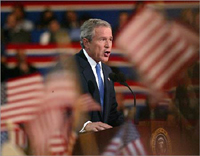Bush’s description of US economy differs greatly from that of Democrats
The picture of a booming economy that President George W. Bush paints is a far cry from the worrisome one increasingly portrayed by Democratic presidential candidates and party leaders.

To them, there are worker insecurities, stagnant wage growth and soaring costs for health care and college.
The vision of rival economies already is a main issue for the 2008 presidential and congressional races. Economists say both sides are right - and wrong. It just depends on what numbers you summon.
Bush is trying to nudge the national focus away from Iraq and is offering a rosy picture of the economy ahead of his presentation Monday of a financial blueprint he says will lead to a balanced budget by 2012.
Congressional Democrats have embraced the same timetable. The course the rival camps chart to get there is bound to be the main domestic-policy battle of the current congressional session.
"Workers are making more money. Their paychecks are going further. Consumers are confident. Investors are optimistic," Bush said in a speech Wednesday at Federal Hall on Wall Street. It was his second on the economy in as many days.
"I'm not surprised that some of the good economic news is overshadowed by the difficult news out of Iraq," Bush told Fox News later Wednesday.
The president credits his first-term tax cuts for much of the upbeat news, ignoring the $10 billion (EUR 7.72 billion) -a-month drain on the government's balance sheets from the unpopular war in Iraq and military actions in Afghanistan and elsewhere to fight terrorism.
Bolstering Bush's outlook was a new Commerce Department report showing that the economy gained speed in the final three months of 2006. The economy grew at an annual rate of 3.6 percent, much faster than the 2 percent increase of the previous three months.
Stocks soared after that report and after the Federal Reserve's decision to leave interest rates steady.
But hold on.
Here comes this from former Sen. John Edwards of North Carolina, reprising the "two Americas" rich-poor divide he depicted in 2004 as a presidential and vice presidential candidate: "We cannot stand by and watch 37 million people wake up and not know how to feed and clothe their children."
Other Democratic presidential hopefuls are echoing the theme.
Also, freshman Sen. James Webb, a Virginia Democrat, built on it when he gave his party's response to Bush's State of the Union address last month. "It's almost as if we are living in two different countries," Webb said.
To William Galston, a domestic policy adviser in the Clinton administration who now is at the Brookings Institution, "We have the president's story of the economic aggregates and we have Jim Webb's story of economic anxiety and inequality.
"That tale of two economies will be argued out, not only between the parties but within the parties," he said.
The Democratic presidential contenders are not shy about weighing in.
"There's something wrong when you have more bankruptcies in America last year than college graduates," Sen. Hillary Clinton of New York said in Iowa.
A 2008 rival, Sen. Barack Obama of Illinois, said, "Our economy is changing rapidly, and that means profound changes for working people." He cited "skyrocketing health care bills," lost pensions and struggles to pay for college.
The cutback in building has led to thousands of layoffs in the construction industry, Democrats note.
Such observations conflict with the glowing picture Bush and his aides present of a vibrant economy humming along at near-full employment.
"They've both got a point, and they're both trying to make their case" said Mark Zandi, chief economist at Moody's Economy.com.
"The president is right. The economy in aggregate is performing very well. So he's right to claim that the economy, looking from above, looks very good," Zandi said. "Democrats are also right. The fruits of this strong economy have largely accrued to higher income wealthier households."
David Wyss, chief economist at Standard & Poor's in New York, said that "any rational way you look at this, the economy is doing pretty decently. You've got a 4.5 percent unemployment rate, productivity growth is solid. And inflation is by historical standards pretty reasonable."
Still, Wyss said, "We've got a couple of big problems out there, and some long-term imbalances. The top 20 percent is doing fairly well and the bottom 20 percent is doing better. If there's a hole, it's in the middle, which frankly are those old blue-collar jobs that the Democrats say are leaving the country. And they're right."
The president's approval on handling the economy was at 43 percent in early January's AP-Ipsos poll, up from December and higher than his overall job approval of 36 percent. The economy, along with Iraq, terrorism and health care are all seen as important issues by the public.
The White House and Democrats battled with dueling economic "fact sheets."
The Democratic headlines: worst job recovery on record; manufacturing jobs continue to disappear at historical levels; share of national income going to wages and salaries see record lows; household income declined by nearly $1,300 (EUR 1,003.55) under Bush.
On the White House list: The economy has created more than 7.2 million jobs since August 2003; the unemployment rate was 4.5 percent in December; real wages rose 1.7 percent during 2006; real after-tax personal income per person has increased over $2,800 (EUR 2,161) - or 9.6 percent - during this administration.
The president did concede a point to Democratic rhetoric on Wednesday, the AP reports.
After Webb emphasized the growing and yawning gulf between salaries of chief executive officers and rank-and-file workers in his Jan. 23 Democratic response, Bush took aim at lavish salaries and bonuses for corporate executives. Corporate boards should "step up to their responsibilities" and tie compensation packages to performance, he said in his Wall Street speech.
Subscribe to Pravda.Ru Telegram channel, Facebook, RSS!


